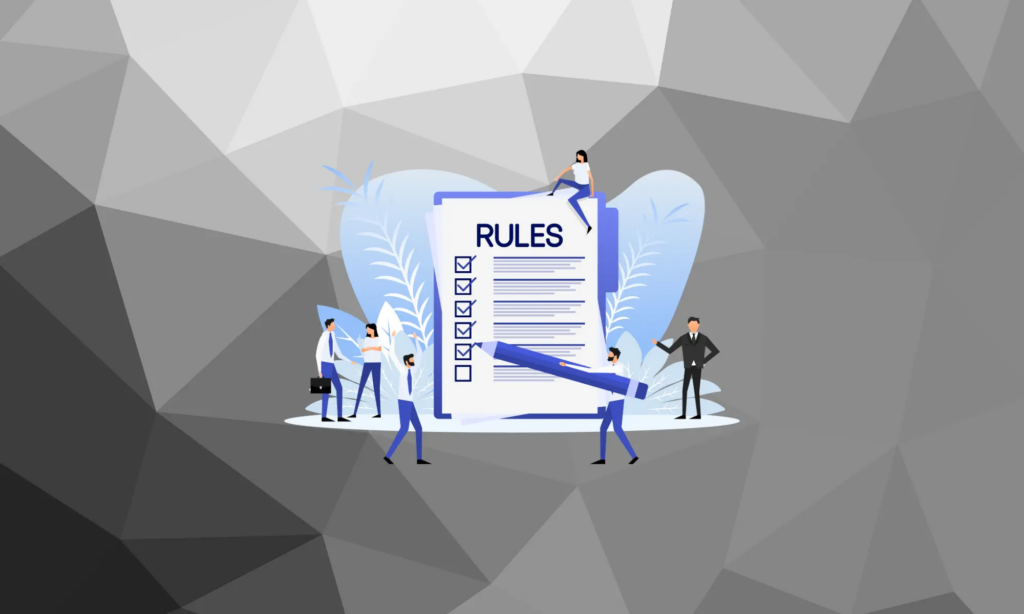
In an era of ever-evolving regulations and increasing business complexity, Compliance as a Service (CaaS) has emerged as a viable solution for businesses looking to manage their compliance needs effectively.
This article will dive into the concept of CaaS, examining its role, benefits, potential drawbacks, and its comparison with traditional compliance officers.
By the end, you’ll have a comprehensive understanding of CaaS and its implications for businesses navigating the challenging terrain of regulatory compliance.
What is Compliance as a Service?
Compliance as a Service (CaaS) is a solution offered by certain companies to assist businesses in maintaining adherence to regulatory requirements essential in their industry.
In simple terms, CaaS shifts the work of regulatory compliance from the business to a specialized third-party provider, leveraging cloud-based technology to ensure ongoing conformity.
The core function of CaaS is to oversee and streamline a business’s regulatory commitments, which can include industry-specific standards, data protection and privacy, financial regulations, or healthcare regulations like HIPAA.
This service eliminates the need for businesses to shoulder the extensive costs of establishing an in-house compliance team or managing the necessary infrastructure themselves.
By entrusting tasks that would traditionally be covered by a compliance officer, businesses can refocus their resources on their core competencies while benefiting from the CaaS provider’s expertise in handling your compliance.
In a world where non-compliance can lead to severe penalties and reputation damage, CaaS offers an effective way to mitigate risk, ensuring that businesses always stay on the right side of the law.
From small businesses searching for compliance officer jobs near me to multinational corporations seeking to outsource corporate compliance officer jobs, CaaS presents a scalable solution that can adapt to the growth and changing needs of an organization.
What Does Compliance as a Service Do?
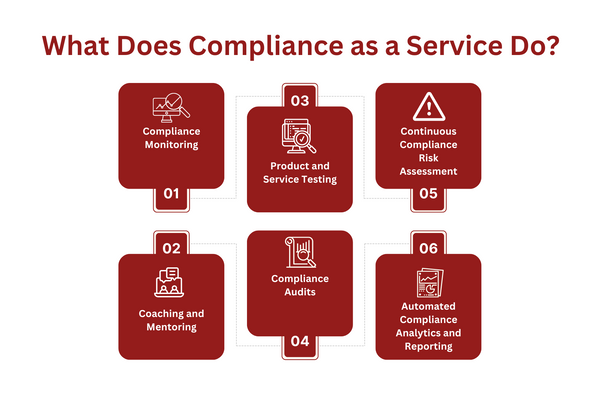
Navigating the multifaceted world of regulatory compliance can be a daunting task for many businesses.
This is where CaaS can prove invaluable. By providing a suite of services aimed at managing and simplifying compliance obligations, CaaS helps businesses focus on their core operations while ensuring they remain on the right side of regulations.
Here are some of the primary tasks CaaS does:
Compliance Monitoring: CaaS providers offer continuous compliance monitoring, ensuring businesses are always in line with regulatory requirements. This proactive approach helps to identify and address any potential compliance issues promptly.
Product and Service Testing: CaaS providers test products and services to identify potential compliance risks. This allows businesses to proactively address issues before they become problematic, reducing the risk of non-compliance.
Continuous Compliance Risk Assessment: CaaS provides ongoing compliance risk assessment, helping businesses avoid potential pitfalls. By constantly assessing the risk landscape, businesses can make informed decisions and mitigate risk effectively.
Coaching and Mentoring: CaaS providers often offer coaching and mentoring services to organizations, educating you on compliance issues. This enhances the organization’s internal capacity to handle compliance matters.
Compliance Audits: CaaS firms conduct thorough compliance audits to identify potential compliance issues. These audits provide an in-depth understanding of a business’s compliance status and highlight areas that need improvement.
Automated Compliance Analytics and Reporting: Using advanced technology, CaaS providers deliver automated compliance analytics and reporting. This provides businesses with real-time insights into their compliance status and helps identify trends and areas for improvement.
CaaS does more than simply manage compliance tasks. It equips businesses with the necessary tools and insights to handle their compliance responsibilities effectively, thereby reducing the risk of non-compliance.
Benefits of Compliance as a Service
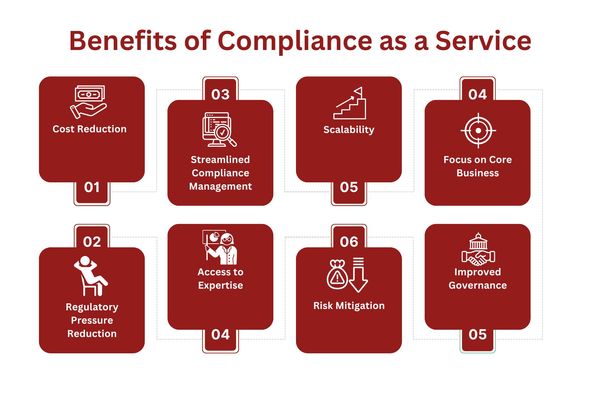
CaaS has emerged as an increasingly popular solution for businesses grappling with the complexities of regulatory compliance.
By outsourcing compliance responsibilities to third-party experts, businesses can realize a host of benefits, ranging from cost savings to streamlined compliance management.
Here’s a deeper look at these advantages:
Cost Reduction
CaaS can significantly reduce costs associated with maintaining an in-house compliance team. These savings extend beyond payroll to include reduced expenses on compliance software, training, and infrastructure, making it a cost-efficient solution.
Regulatory Pressure Reduction
With a CaaS provider, businesses can relieve the pressure of staying alert with changing regulations. Your CaaS will ensure continuous compliance, reducing the risk of penalties and sanctions that can come from non-compliance.
Streamlined Compliance Management
CaaS providers leverage cloud-based technology to streamline compliance management. Automated processes and real-time reporting make compliance more efficient and less resource-intensive.
Access to Expertise
CaaS gives businesses access to compliance experts without the need for hiring in-house. This expertise can be invaluable in navigating complex and ever-changing regulatory landscapes.
Scalability
As businesses grow, their compliance needs can change. CaaS offers a scalable solution that can adapt to these changes without the need for businesses to expand their in-house teams.
Risk Mitigation
CaaS providers continuously monitor the compliance risks, providing businesses with valuable insights to mitigate potential compliance risks before they escalate.
Focus on Core Business
Outsourcing compliance to a CaaS provider frees up internal resources, allowing businesses to focus on their core competencies and strategic objectives.
Improved Governance
CaaS providers offer comprehensive reporting and documentation, enhancing transparency and enabling improved governance and decision-making.
While the benefits of CaaS are compelling, it’s essential for businesses to assess their unique needs and circumstances before choosing a compliance management approach.
Drawbacks of Compliance as a Service
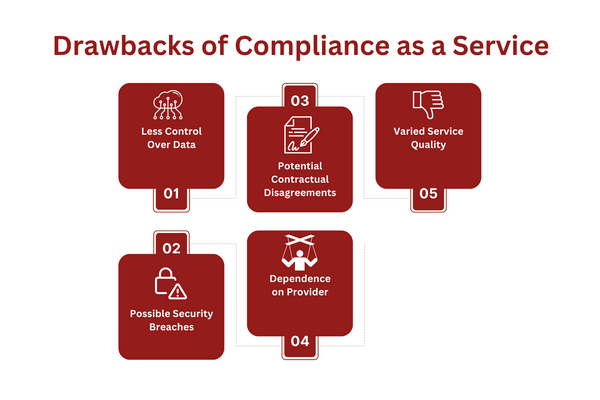
Despite the benefits of CaaS, it’s important for businesses to be aware of some potential drawbacks. As with any outsourced service, there are some issues that can happen
Here’s an overview of the drawbacks of CaaS.
Less Control Over Data
The delegation of compliance tasks to a third-party means handing over substantial amounts of sensitive data. Businesses may feel they have less control over their data, which could potentially lead to concerns about confidentiality and data protection.
Possible Security Breaches
While CaaS providers typically have robust security measures in place, no system is immune to breaches. The transfer of sensitive personal information to an external provider can open up additional avenues for potential cyber-attacks.
Potential Contractual Disagreements
Outsourcing compliance duties require a contractual agreement between the business and the CaaS provider. There’s always the possibility of disagreements arising over the scope of the agreement, the responsibilities of each party, or the interpretation of the contract terms.
Dependence on Provider
Relying on a CaaS provider can lead to a level of dependency, which could become problematic if the provider’s services deteriorate, if they go out of business, or if they happen to raise their prices significantly. Businesses need to have contingency plans in place to handle these scenarios.
Varied Service Quality
While many outsourced compliance officer firms are top-notch, the quality of service can vary between providers. Not all CaaS providers are created equal, and a sub-par service can result in incomplete or ineffective compliance measures.
Is Outsourcing Compliance a Good Idea?
The decision to outsource compliance responsibilities to a CaaS provider is one that must be made with careful consideration. Each business is unique, with different risk profiles, operational needs, and strategic objectives. So, there isn’t necessarily a ‘right’ approach to compliance management.
Outsourcing compliance can be a good idea for many businesses. It allows them to leverage the expertise of specialized compliance officer firms, freeing up internal resources to focus on the core competencies of the business.
By handing off the task to those with expertise in the field, businesses often find that they can achieve a higher level of compliance more efficiently and effectively. Moreover, it offers the flexibility to scale up or down as the business grows or changes, without the need to recruit, train, or lay off staff.
However, for some businesses, hiring an in-house compliance officer or team might be a preferable option.
This approach can provide a greater degree of control and oversight, particularly for companies in highly regulated industries, or those with specific, complex compliance needs.
An in-house team might also be more familiar with the business’s unique processes and culture, allowing them to tailor their approach to compliance management more closely to the company’s needs.
Compliance Officer vs CaaS: Which is Better?
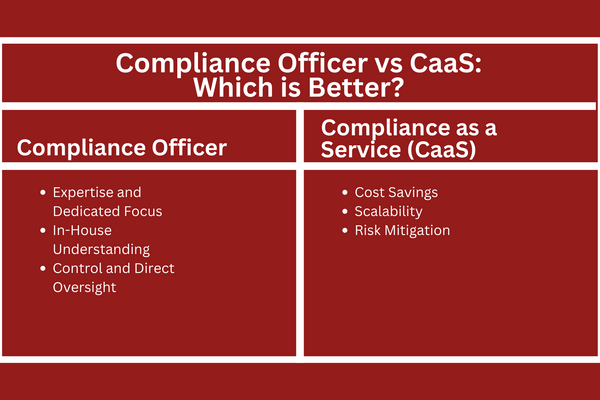
When it comes to managing regulatory compliance, businesses face the choice between hiring a dedicated compliance officer or outsourcing to a CaaS provider.
Both options have their distinct advantages, and the best choice will depend on a range of factors, including a business’s specific needs, budget, and strategic objectives.
Compliance Officer
Expertise and Dedicated Focus: A compliance officer brings a wealth of knowledge and a dedicated focus on compliance. With their expertise, they can navigate complex regulatory landscapes and implement robust compliance policies that fit the business’s unique needs.
In-House Understanding: Having an in-house compliance officer means having someone who deeply understands the business’s operations, culture, and specific risks. This understanding can lead to more tailored and effective compliance strategies that are closely aligned with the company’s operations.
Control and Direct Oversight: An in-house compliance officer provides direct control and oversight. This enables quicker decision-making and immediate action when compliance issues arise.
Compliance as a Service (CaaS)
Cost Savings: CaaS can often deliver significant cost savings. It eliminates the need for businesses to hire, train, and retain full-time compliance officers and other compliance staff, reducing overhead costs while providing access to expert compliance services.
Scalability: CaaS offers scalable solutions that can grow or shrink according to the business’s needs. This flexibility can be particularly beneficial for businesses experiencing rapid growth or operating in a volatile market.
Risk Mitigation: CaaS providers use advanced tools and expertise to continuously monitor compliance risks. They keep up-to-date with regulatory changes and help businesses adapt accordingly.
A small business with less complex compliance needs may find an outsourced service to be more cost-effective, while a larger company in a heavily regulated industry may prefer the direct control that an in-house compliance officer provides.
How to Implement Compliance as a Service?
As businesses move towards adopting CaaS, it’s crucial to understand the steps involved in implementing this solution.
The transition to CaaS is not simply about switching providers but about embracing a new approach to managing regulatory compliance.
Here’s a roadmap to guide businesses through this process:
Analyze Your Current Compliance Framework
Understanding your existing compliance framework is the first step towards implementing CaaS. Evaluate your existing compliance strategies, the tools and technologies in use, and the challenges you face. This analysis will provide a baseline for understanding what you need from a CaaS provider. A compliance consultant can assist you with this if needed.
Identify Your Compliance Needs
Once you have a clear understanding of your current compliance framework, identify your specific compliance needs. Consider factors such as the size of your business, the regulatory environment in which you operate, and your risk profile. These considerations will help define the level and type of service you need from a CaaS provider.
Research CaaS Providers
Not all CaaS providers are the same. Some may specialize in certain industries or have particular strengths. Conduct thorough research to find a provider that aligns with your specific needs. Look at their track record, their expertise, and the range of services they offer.
Evaluate CaaS Provider Proposals
Once you have shortlisted potential providers, request proposals detailing how they would manage your compliance requirements. Evaluate these proposals based on how well they address your needs, the provider’s approach to compliance management, and the cost of their services.
Allow the CaaS Vendor to Implement Their Compliance Framework
After selecting a provider, the next step is to allow them to implement their compliance framework. This process may involve integrating their technology with your systems, training your staff, and setting up processes for regular communication and reporting.
Continuously Monitoring and Evaluating the Service
Implementing CaaS is not a one-time event but an ongoing process. Continuously monitor the effectiveness of the service, and regularly evaluate the provider against the agreed-upon objectives. This will ensure that the CaaS provider continues to meet your compliance needs as your business evolves.
FAQs
What Are The Three Types Of Compliance?
Regulatory Compliance: Adherence to laws and regulations.
Corporate Compliance: Adherence to internal policies.
IT Compliance: Adherence to legal and industry IT standards.
What Are The 4 C Of Compliance?
Culture: Encouraging ethical behavior.
Compliance: Adherence to rules.
Control: Systems to monitor compliance.
Communication: Keeping stakeholders informed.
What Does Compliance Mean in the Workplace?
In the workplace, compliance refers to conforming to company policies and regulations as well as all applicable laws. It includes taking reasonable steps to ensure that workers are not only aware of such requirements but also act in accordance with them at all times.
Compliance can involve setting up training programs for employees or implementing procedures designed to reduce the likelihood of non-compliance. It also includes keeping accurate records and conducting audits to detect irregularities or violations.
What Are The Basic Elements Of Compliance?
Standards and procedures.
Oversight by high-level personnel.
Training and education.
Monitoring and reporting systems.
Disciplinary measures.
Corrective action procedures.
What Is Compliance as a Service In Cloud Computing?
CaaS in cloud computing is where a third-party provider helps businesses ensure their cloud operations adhere to relevant regulations. It offers tools and expertise to manage compliance effectively.
Closing
After reading this article, the next logical step for any business would be to evaluate its current compliance strategy.
You should consider whether the benefits of CaaS align with your business’s needs and objectives. Reflect on whether outsourcing compliance could provide cost savings, scalability, and risk mitigation while allowing you to focus more intently on your core business functions.
Captain Compliance can help you take this next step. We provide businesses with a hassle-free and efficient way to outsource compliance. Our solution encompasses all key aspects of compliance, offering you access to regulatory expertise and solutions.